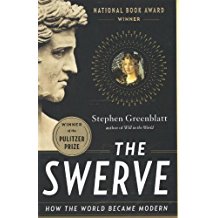The Swerve: How the World Became Modern, Stephen Greenblatt, 2011
A most unlikely best-seller and winner of the National Book Award, Greenblatt’s tale of Lucretius, a 1st Century BCE Roman poet whose six-volume De Rerum Natura was lost for centuries until discovered by a papal secretary Poggio Brocciolini in a German monastery in the 15th Century. Lucretius articulated the atomist philosophy of Epicurus, a Greek philosopher from the 5th Century BCE. Atomism claimed that the universe, including man, was made up of tiny, indivisible particles that “swerved” to aggregate and comprise an object. Man was made from and would return to atoms. The soul was material as was the body. The gods (or God) had no influence on this. Lucretius wrote his work in beautiful hexameter. Poggio’s discovery loosed atomism on the Renaissance and modern times were born.



